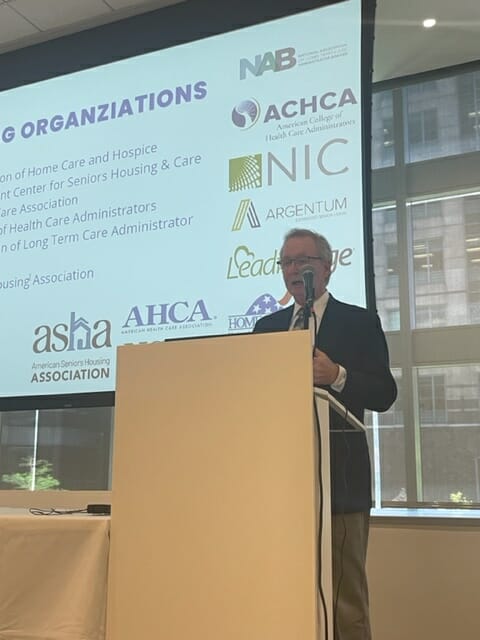The pipeline to better develop home care and other long-term and post-acute care leaders took another big step forward Tuesday in Chicago with the announcement of the Vision Centre: Leadership Development for Aging Services initiative.
The unveiling signifies a renaming of the Vision 2025 campaign, which was started five years ago to study and build more formal pathways for college- and university-trained leaders in home care, hospice care, adult day services, skilled nursing, independent living and assisted living.
The Vision Centre is under formal IRS review to become a 501(c)3 nonprofit organization. More than 80 thought leaders from higher education and the senior living, care and service sectors are meeting Tuesday and Wednesday at a conference in the Windy City to firm up action plans.

Vision Centre Board of Trustees Chairman Steve Chies said that the need for enhanced leadership education is dire. Nearly 51,000 additional leaders will be needed by 2030, he said, citing figures based on figures from the U.S. Census Bureau and the Centers for Disease Control and Prevention. That includes 5,400 more for home care and nearly 2,000 more for hospice, he noted.
“It really is so important for us,” said Andrea Devoti, executive vice president of the National Association for Home Care & Hospice. “We’re in the process now of joining several workforce coalitions, or have established workforce coalitions, and that includes us getting our members to work within the educational systems in their country.”
Diverse aging services panel
She was set to speak on a panel Wednesday morning, along with leaders from the seven other sponsoring constituent groups: the National Investment Center for Seniors Housing & Care, the American College of Health Care Administrators, the American Health Care Association/National Center for Assisted Living, LeadingAge, the American Seniors Housing Association, Argentum, the National Association of Long-Term Care Administrator Boards Foundation (NAB Foundation). Ziegler is once again a sponsor and hosting the annual conference.
“We have 1,200 members, and if each one worked with a university in their geographical area, we could help drive those points about workforce leadership in post-acute care, but also the direct care workers, the nurses, the therapists,” Devoti told McKnight’s Tuesday.
“We need to actually talk about it at our upcoming conferences, about our partnership with the Vision Centre because we haven’t talked about the fact that behind the scenes we’re trying to work with other like-minded organizations that are trying to develop the industry.”
She said that the group will soon post information about it on its website.
“We’ll encourage all [members] to do what we’ve done a little bit at our association, but also as many of our members do: Get out there and talk to your local CCRCs [continuing care retirement communities] and senior living operators, as well as universities, to see if, as a group, you can build something that will help the pipeline.”
“You can’t make change if you’re not part of helping to develop it,” she added. She called for recognition that “a dearth of workforce, whether it’s leadership or hands-on care, is out there.
“We need leaders in home care,” she noted. “Many are definitely mid- to late baby boomers and retiring.”
Workforce crisis
NAHC, along the Home Care Association of America and home care provider Bayada in May launched the Home Care Workforce Action Alliance. The alliance is devoted to improving the workforce shortage. Currently, the alliance is looking to solicit other organizations to join the cause.
The Vision Centre’s goals include creating 25 robust university and college programs designed to prepare future generations of leaders for aging-adult service organizations. They also include getting those programs to foster 1,000 paid internships among senior housing, care and aging services by 2025, something both Chies and Vision 2025/Centre founder Douglas Olson, Ph.D., of the University of Wisconsin-Eau Claire, call the potentially most special part of the initiative.
Sean Kelly, vice chairman of Vision Centre’s board of trustees and CEO of the Kendal Corp., which operates a dozen senior living communities in nine states, said that momentum is on providers’ side with Tuesday’s announcement.
“The Vision Centre will be of all of our making and will be the driver of the evolution that we seek,” he said. “It will be a place that brings about the continued professionalization in our field and where our colleagues will meet, learn, inspire and be inspired.”


